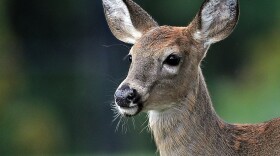As hunters head into the woods this weekend, local wildlife rehabilitation groups are asking hunters to keep them in mind.
There’s no shortage of animals in need of care at Wild Instincts wildlife rehabilitation and of course with that care comes a lot of feedings.
“We go through probably about 3,000 lbs. a year,” said Wild Instincts Director of Rehabilitation Mark Naniot.
Deer hunters can help with that.
Naniot says they can use things like hearts, lean trimmings, unseasoned venison. They’ll even take the whole deer.
“We have some people that like to hunt but don’t necessarily like to eat the meat. Some will donate the whole carcass and we’ll be happy to take that as well,” he said.
Wild Instincts won’t take rib cages, legs, heads, liver or any meat that’s been seasoned.
Lead & hunting
If you used lead ammo, Naniot says they’ll still accept it, but just asks they you let them know.
“When lead bullets are shot through an animal those lead particles can go about 8 inches in diameter from the wound site. That can mean heart, lungs, liver, a lot of those things, the front shoulder, a lot of those parts can be contaminated with lead, just have to be extremely careful in what we’re feeding to that. It’s highly toxic to birds, mammals not quite as bad. So we can feed some of that coyotes, foxes, and things but not eagles,” said Naniot.
In October, Wild Instincts treated three eagles and one trumpeter swan for lead poisoning.
When deer is a shot with a lead bullet, particles from it can go up to 8 inches from the entry point.
It doesn’t take consuming much for an animal to get sick.
While birds are usually more affected, lead ammo and sinkers can impact the whole ecosystem.
“Any of those animals that feed on those little particulates can cause lead poisoning in any of those animals. It’s not good for us either,” said Naniot. “It’s something we should definitely avoid and get it out of our hunting and fishing equipment. I realize now ammunition is a little harder to get and yes it’s a little bit more expensive, but when you consider the cost over the long run, you’re keeping a lot animals safe.”
Naniot encourages the use of copper ammo as a good alternative to lead.
You can drop the donations of at Wild Instincts. If it’s a warmer day, they ask you to give them a call so they can make sure the meat doesn’t spoil.
Wild Instincts is located at 4621 Apperson Dr, Rhinelander, WI 54501. The phone number is
(715) 362-9453.
Have a heart
The Raptor Education Group, Inc. in Antigo also accepts deer heart donations.
REGI rehabilitates and cares for 600-800 raptors and other birds a year. Deer hearts offer a natural, low-fat, high protein food source for the hawks, eagles, owls and falcons of REGI.
Deer season offers an opportunity for hunters to help REGI by donating their deer hearts.
The following are the REGI donation drop off sites for 2021:
Antigo Ken's Hwy 45 Meat Market 715-623-3554 N2220 US Highway 45
Antigo Raptor Education Group, Inc. 715-623-4015 N2160 W Rollwood Rd
Eagle River Prime Choice Meat Market 715-479-4456 1144 Highway 45 South
Gillett Northwoods Veterinary Clinic 920-855-2229 9920 State Hwy 22 E
Land O'Lakes The Tackle Box 715-547-3434 4267 Hwy B
Rhinelander Ascension Ministry Rehab 715-361-2300 2003 Winnebago Street
Stevens Point People's Meat Market 715-592-6328 6811 Burr Oak Rd
Stevens Point Rusty's Backwater Saloon 715-341-2490 1715 W River Dr
Stevens Point Renee's Red Rooster 715-344-9825 1247 Rocky Run Road
Wausau Zillman's Meat Market 715-845-5123 1910 6th St., Wausau
Wausau Wild Birds Unlimited 715-298-3140 4121 Rib Mountain Dr








